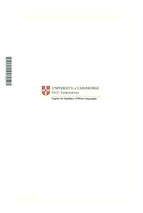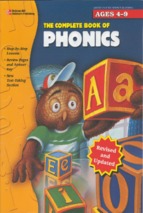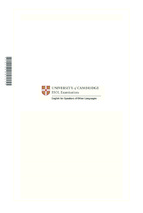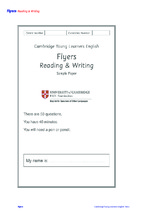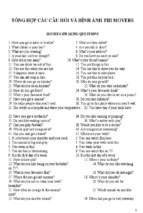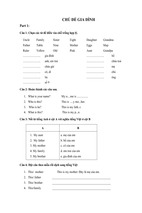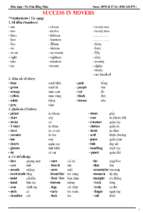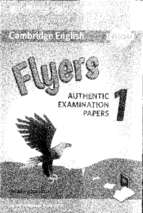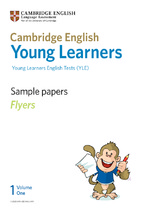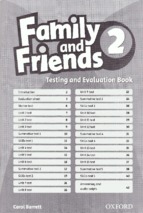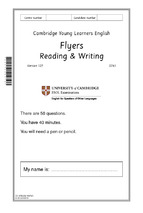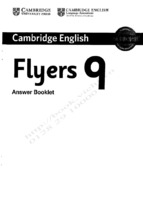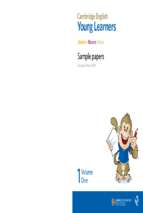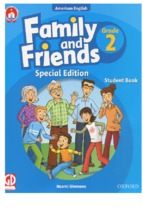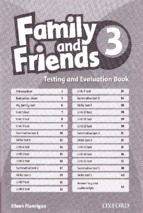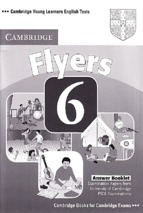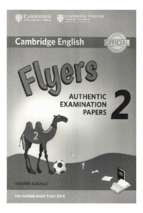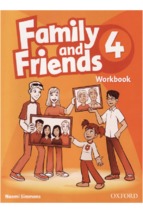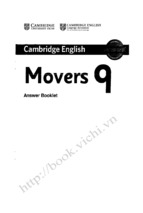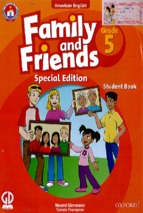FAMILY AND FRIENDS 6 (Second Edition)
visit the link to get test
Website : https://1001dethi.com/
SÁCH STARTERS :
Cụ thể : 1 bộ sách Starters 9 cuốn +audio listening
Trọn gói : 50.000Đ.
SÁCH MOVERS :
Cụ thể : 1 bộ sách Movers 9 cuốn + audio listening
Trọn gói : 50.000Đ.
SÁCH FLYERS :
Cụ thể : 1 bộ sách Flyers 9 cuốn +audio listening
Trọn gói : 50.000Đ
SÁCH KET :
Cụ thể : 1 bộ sách KET 10 cuốn +audio listening
Trọn gói : 50.000Đ
SÁCH PET :
Cụ thể : 1 bộ sách PET 8 cuốn +audio listening
Trọn gói : 40.000Đ
SÁCH Longman New Real Toeic (Trọn bộ 3 cuốn RC,LC và Full)
Trọn gói : 30.000Đ
S:cj0pe and sequence
page 4
Starter: WÉGSdïB [IxDGCÍ
Present simple
Present continuous
Past simple
Past continuous
going to and will
I'm going to visit an art gallery this afternoon.
I'll come with you.
Present continuous with future meaning
We're meeting at 10 o'clock.
Irregular past forms
Reading: A story: Js/and
Adventure (Cross-curricular link)
Listening: Listening for details
a b o u ta painting
Writing focus: Writing a story
Writing outcome: Completing a
story (Workbook)
Speaking: Asking and answering
questions about paintings
Sports adventures!
Extreme sports
Working with words:
Prefixes dis- / inWords in context:
Tanya Streeter
page 16
First conditional and first conditional questions Reading; A sports profile: Tanya
Writing focus: Using a concept
I f the weather is good, we'll go paragliding.
Will you come for a walk if the weather is good?
Streeter
map to plan
Listening: Listening for details in a
Writing outcome: Completing a
Second conditional and second conditional
questions
sports profile.
concept map and using it to write a
leaflet (Workbook)
I f I had a camera, I'd take a picture.
Speaking: Asking and answering
questions about sports
Would you play rugby if you lived in England?
It's festival time!
Festival adjectives
Working with words:
Suffix -ous
Words in context:
Top Ten Food Festivals
page 24
Present perfect: since / for / already / just /
Reading: A travel article: Top Ten
Writing focus: Letter-writing
yet / before
Food Festivals
conventions
I've been here since nine o'clock / for five days.
The procession has already /just finished.
I haven't seen any fireworks yet.
I've never eaten anything so delicious before.
Listening: Listening for details in
Writing outcome: Writing a letter
an interview
to a friend (Workbook)
Speaking: Asking and answering
questions about food festivals
Past simple and present perfect
I went to that festival last year.
I've made my costume.
Fluency Time! 1
Discussing future plans
Project: a diary
page 32
Extensive reading: non-fiction The Olympic Carnes, fiction The Picture of Dorian Cray page 34
Transport of the future!
page 38
Forms of transport
I Working with words:
Phrasal verbs
I Words in context:
Transport Around the World
Present perfect continuous 1
Reading: A book extract: Transport
Writing focus: Using process
Passengers have been waiting for five hours.
Around the World
diagrams
Time markers
Listening: Listening for details in
an interview
Writing outcome: Using a process
since / for / all morning / all day / all week
Present perfect continuous 2
I'm tired because I've been working.
What have you been doing?
Have you been swimming?
Speaking: Asking and answering
diagram to explain how to ride a
bike (Workbook)
questions about different forms of
transport
The greatest inventions!
Inventions
Working with words:
The passive (present simple and past simple)
page 46
Reading: A timeline: The History o f
the Pen (Cross-curricular link)
Suffix -ment
Many kinds o f chewing gum are made.
The gum wasn't advertised.
Words in context:
The passive (present continuous)
Listening: Identifying opinions
Speaking: Asking and answering
The History o f the Pen
M y computer is being repaired.
questions about inventions
Writing focus: Writing a biography
Writing outcome: Writing a
biography (Workbook)
You've won a computer!
Computer verbs
I Working with words;
Homonyms
I Words in context:
Computers - Fun Facts
page 54
Writing focus: Presenting a
The passive (future)
Reading: A website article:
You will be given ten new laptops for your school.
Computers - Fun Facts
research report
(Cross-curricular link)
Writing outcome: Writing a
Listening: Listening for details
about why people use computers
research report (Workbook)
The passive (present perfect)
These wires have been disconnected.
Speaking: Asking and answering
questions about computers
Fluency Time! 2
Requesting favours
Project: an inventions poster
Extensive reading: non-fiction Diaries from Delhi, fiction Black Beauty
page 62
page 64
Grammar
Words
Explorers for a day!
Exploring
Working with words:
Suffixes -erl-ist
Words in context:
Famous Shipwrecks
Skills
page 68
Relative pronouns: w ho, which
Reading: An encyclopedia entry:
Writing focus: Writing a
There are many climbers who successfully climb
Mount Everest.
They climb a mountain there which is the highest
mountain in the world.
Famous Shipwrecks
(Cross-curricular link)
personalized text about your
dream job
Listening: Listening for details in
Writing outcome: Writing a
a tour
personalized text (Workbook)
Reported pronouns: th a t
Speaking: Asking and answering
He met a man that was more than 120 years old.
questions about being an explorer
It's a mystery!
Mysteries
Working with words:
Suffix -able
Words in context:
The Nazca Lines
page 76
Past perfect
After they had climbed onto the ship, they saw there
was no one there.
Past perfect negative sentences and questions
They hadn't invented trucks and trains before they
built the pyramids.
Had people invented trucks and trains before they
built the pyramids?
Reading: An interview: rfieWazca
Writing focus: Features of a tourist
Lines (Cross-curricular link)
information leaflet
Listening: Listening for details in
Writing outcome: Writing a tourist
an advert
information leaflet (Workbook)
Speaking: Asking and answering
questions about mysteries
Survival!
Survival items
Working with words;
Homophones
page 84
Third conditional
If the machine had worked, he would have been
happy.
Words in context:
Modal verbs: h a v e to, m ust, sh o u ld and o u g h t to
Robinson Crusoe
You have to bring a water bottle.
You mustn't touch any inseơs.
You shouldn't bring valuable possessions.
You ought to bring a camera.
Reading; A story extract: Robinson
Writing focus: Features of an
Crusoe
advice text
Listening: Listening to order events Writing outcome: Writing an
advice text (Workbook)
Speaking; Asking and answering
questions about surviving on a
desert island
Fluency Time! 3
Solving problems
Project: a survival board game
page 92
Extensive reading: non-fiction Atlantis: The Lost City, fiction We Didn't Mean to Co to Sea page 94
page 98
,Around the world Ị
World languages
Working with words:
Suffix -ery
Words in context:
Languages o f the World
Reported speech (all tenses)
He said he wanted to visit lots o f countries.
He said he was looking forward to the trip.
He said he had cycled around Africa.
He said he had had lessons in French and Arabic.
He said the trip would take about two years.
Reflexive pronouns: m yself, yourself, itself,
him self, herself, ourselves, yourselves and
Reading: A question and answer
text: Languages o f the World (Cross
curricular link)
advert
Listening: Listening to match
advert (Workbook)
Writing focus: Features of an
Writing outcome: Writing an
speakers to statements
Speaking: Asking and answering
questions about languages
them selves
The machine turned itself off.
11
Space travel!
page 106
Space
Working with words:
Reported speech: W h - questions Where,
W hat, Who and When
Reading: A poem: Dreaming in a
Spaceship (Cross-curricular link)
Writing focus: Writing a poem and
Phrasal verbs
He asked him where he was.
Listening: Identifying missing
Writing outcome: Writing a poem
Words in context:
Reported speech; commands and requests
words in a poem
using similes (Workbook)
Dreaming in a Spaceship
to ld /a s k e d
He told us to turn o ff our mobile phones.
He asked them to leave quietly.
12
Why,
using similes
Speaking: Asking and answering
questions about space
Holiday time!
Holiday adjectives
Working with words:
Silent letters: w a n d /7
Words in context:
M y Year Around the World
page 114
wish
Reading: A travel blog: M y
I wish I was taller.
I wish I could fly.
I wish it wasn't the last day o f our holiday.
Around the World
Question tags
There are lots o f robots, aren't there?
You can swim, can't you?
You like ice cream, don't you?
Year
(Cross-curricular link)
Listening: Listening for details in
an interview
Writing focus:
Structuring an essay
Writing outcome:
Writing an essay (Workbook)
Speaking: Asking and answering
questions about travelling
[Fluency Time! 4
Dream adventures
’reject: a space tourist brochure
Extensive reading: non-fiction The Mysteries of Mars, fiction The Diary of an Astronaut
Culture
Films in English
Canada
English around the World
Class play: The Mystery of the Diamond Ring
page 122
page 124
page 128
page 134
r
^
starter
XVelcome back!
Lesson One Story
1 Listen and read. Where does Tom come from? ^
Tom
01
Tom, come and meet my other cousins!
Hi, Tom! I'm Ed. This is my sister, Kate.
Shall we show you the
Great! Thanks!
We do lots of things at the DSD clab.
Lastyear, we did a play. Bat Fin’s carl
broke down and he had the costumes!
S o^eho^^^eo^^se^
DOSOMETIIINGDIFFEIIEIIT!
This was our time capsule. We put in a magazine,
a CD, a map of the town and lots more " ■
™
And this is the time we cleaned up the river!
It was r e a l l ) ^ i ( ^ J ^
Starter Welcome back!
Tom
Ed
You have a lot of fun at th e DSD club!
Yes, we do. It's really good.
Lesson One Story
Fin
Tom
Fin
w hat do you think of the
Do Something Different clab, Tom?
I think it's great! Can I join? ^
\\
Ị
Yes, of coarse! Here's yoar DSD T-shirt and cap!
2 Listen to the story again and repeat. Act.
3 Read again and write
True
or False.
1 Ed and Kate went on holiday to Spain,
True
2 Libby and her family stayed at home.
3 Libby is Tom's cousin.
4 Fin had the costumes for the play in his car.
5 Tom enjoys playing sport.
6 Fin gives Tom a bag and a T-shirt.
Welcome back!
Starter
Lesson Two Grammar 1
1 Listen and read. Where did Professor go? ®
Did you enjoy the robot
convention, Professor?
Yes, thanks, chip. I go
there every year. It's
always great!
2
02
m
w hut are you doing?
f K
M
R
u
m
p
Wow! It's a
little Chip!
'm looking ^oryoar preser\t.
Here it is! When I was
walking around the robot
convention, I saw this!
Yes! It walks and it talks, when I
was sitting on the plane, it said
hello to the man next to me!
Read and learn.
''
Present simple and present continuous
Past simple and past continuous
Use the present simple to ta lk about habits
and routines.
I go there every year.
It's always great!
Use the past simple to ta lk about actions
th a t interrupted other actions in the past.
When I was sitting on the plane, it said hello
to the man next to me!
Use the present continuous to ta lk about
actions happening now.
What are you doing?
I'm looking for your present.
Λ
Use the past continuous to ta lk about
actions th a t were interrupted.
When I was walking around, I saw this.
3 Read and circle.
1
am going swimming on Saturday mornings.
2 My brother watches / is watching TV at the moment.
3 My mum and dad work / are working every day.
4 We have / are having lunch now.
5 The boys play / are playing football in the
6 The children work / are working hard at
park on Saturdays.
the moment.
Ask and answer.
e a t/ic e cream
p la y /fo o tb a ll
s it/o n the grass
w a it/fo r a bus
g o /in to a café
run /ho m e
What was he doing when
the storm started?
He was eating ice cream. y
w h at did he do next?
(He ran home.
It's Numbers!
Starter
Present simple and present continuous, and past simple and past continuous
Lesson Three Grammar 2
Q Irregular past forms
---------------------------------------------------------------------------
With some irregular verbs, the past simple and
the past participle are the same.
1
Verb
bug
Past tense
bought
Past participle
bought
\
With other irregular verbs, the past simple and the
past participle are different.
Verb
1 speak
2 hear
2 grow
3 make
3 take
4 use
4 wear
5 keep
5 write
6 have
6 fly
7 catch
7 eat
8 get
8 see
9 find
9 go
Past tense
spoke
Past participle
spoken
i
1 Complete the tables.
Irregular verb list Workbook 6 page 135 )
2 Listen and order the lines. Sing. ® 03
Welcome bock!
You're back from your break in the sun.
And there's lots of work in store.
Now it's buck to school once more.
You're sad your holiday's done.
You hud a good time by the sea
With your friends and your family.
But you can still have some fun
Now your lessons have begun.
You visited people you knew,
So vjelcome back today.
You went to a funfair or two,
But you kne\Nyou couldn’t stay,
Irregular past forms and song
Starter
β ίβ Π ΰ φ ίίΰ
Lesson One Story
1 Listen and read. What is the theme for the mural?
04
Fin
Hi, everybody! Today, we're going
to talk about our next project
Libby What are we going to do?
Fin
The club walls look terrible!
So, I'd like you all to paint them.
t
Libby Let's paint animals from different countries.
Kate Oh, no. Animals are impossible to draw. I.
Tom
»1 I
Kate How about flags or maps? They're easy.
Libby I think we want something more exciting.
What will we paint?
Well, I want each group to paint a mural
on one of the walls. The theme is 'Around
the world', but you can decide what to do
■
■
mmM y
yụ—Tế
■ ί η κι
w hat about portraits of famousj
people from around the world?
That's really difficult, too! p ^ \ J '
ί
1 ■
O P ----------— .JL I
m■
Time to go home! We'll talk about
your ideas at the next club meeting]
Tom But we don't know what to d o !__
Libby Let's meet at the library t omorrow
and decide! \ y
2 Listen to the story again and repeat. Act.
3 Read again and write
True
or False.
True
2
The theme is 'Around the world'.
3 Kate is good at drawing animals.
_______
4
Ed wants to draw people.
5 Libby likes Kate's idea.
_______
6
The children are going to
1 The children are going to paint the walls.
meet the next day.
8
Unit 1 Art project!
f
-----
Lesson Two Words
1 Listen and repeat. ®
05
2 Write the words.
1
painting
noun
0
picture that someone has painted
2
noun a building where you can go to look at paintings and other art
3
noun a picture of a person
4
noun a picture of the countryside
5
noun the part of a picture that looks like it's near you
6
noun the part of a picture that looks like it's far from you
7
noun an animal, a shape, or a person made from stone, wood, etc.
8
noun a very big picture painted on a wall
Working with words
We add the prefixes un- or im- to some adjectives to make the meaning negative.
ctionary
Dictionary
Workbook 6
popular
friendly
tid y
patient
possible
polite
unpopular
unfriendly
untidy
im patient
impossible
im polite
3 Listen and repeat. ®
pages 126-134
06
4 Read and circle.
1 Tom is very
friendly Aịmừiendly). He never speaks to anyone.
2 My sister is very popular / unpopular. Everyone likes her.
3 Jon is a very polite / impolite boy. He always says'please'and'thank you'.
4 Your room is so tidy / untidyl There are books and clothes all over the floor.
5 My little brother is very patient / impatient. He always waits calmly.
6 This maths question is possible / impossiblei I don't know the answer!
Words
Unit 1
Lesson Three Grammar 1
1 Listen and read. Where do Professor and Chip go? ® 07
mnêêOR < cmp
Look at the scalpture!
It's a robot like me!
I'm going to visit an art
gallery this afternoon.
2 Read and learn.
3 Read and circle.
1 Our class will /(/s going t(^go to a museum next week.
2 "I'm thirsty!""/'// / I'm going to get you a drink."
3 "Do you want to come to town?""No, / won't / I'm not going to come. I've got too much homework."
4 We won't / We're not going to visit our grandparents today. They're away on holiday.
5 "I can't find my pen." "Don't worry! I'll / I'm going to lend you mine."
6 I'll / I'm going to buy a travel book for my holiday next week.
4 Complete the sentences. Use w ill or going
1 A
"I’m qoinq to
B " I’ll
buy an ice cream."
come with you!"
2 A
B "I
close the window."
B
5 A "I
pack my suitcase."
6 A
B "I
help you."
Unit 1 going to and will
take my camera to the zoo."
B
4 A
3 A "I'm cold."
10
to.
B
take mine, too."
visit India this summer."
help you."
Complete CrommorTime Exercise 1 on page 116 of Workbook 6?)
Lesson Four Grammar 2
1 Listen and read. Where does Harry want to go with Ben? ®
08
Hi Ben,
W hat are you doing today? I'm catching a bus at 10.15 into town with
Fred. Do you want to come? We're meeting Jack at 1 1 o'clock at the
bus station. Then, at 12 o'clock, we're going to an art exhibition at our
friend's art club.
In the afternoon, Fred is watching a film at the cinema. He already
has tickets, but there are no tickets left, so we can't go! I'm not doing
anything. Do you want to watch a DVD at my house instead?
See you soon!
Harry
2 Read and learn.
^
Present continuous with future meaning
Use the present continuous to talk about definite future plans
and arrangements.
We're meeting at ten o'clock.
I'm not doing anything.
What are you doing today?
3 Complete the sentences. Use the present continuous.
1 I'm meeting __________________ (meet) Ben at one o'clock this afternoon.
2 We_______________________________(catch) a train at half past three.
3 _______________________________(you / visit) your grandparents after school?
4 The children
____________________________(play) in a football match at two o'clock.
5 What film __
6 Jeff
(you / watch) at the cinema tonight?
(go) to a café with his friends for his birthday lunch.
Ask and answer.
fe e d /th e penguins
g o / home
have / lunch
leave / school
visit / the elephant enclosure
watch / the dolphin display
What are they
doing at 8.00 a.m.?
V
iljÿ Complete Crommor Time Exercise 2 on poge 116 of Workbook"^
At 8.00 a.m., they're
leaving school.
Present continuous with future meaning
Unit 1
11
1 Look at the story and the paintings, w h ic h painting do you think the story is about?
2 Listen and read. ^
09
Isla n d A d v en tu re
Max was staying with his cousin Jeff by the sea. Every day, the boys went to
the beach and played football or went fishing. But one day, they stood on
the sand and stared across the sea at a small island in the distance. N o one
lived on the island and the boys had never been there.
'T d like to explore that island," said Max.
"Let's borrow my brother's boat and go there," said Jeff.
"We'll be back before he finds out!"
The boys rowed to the island and left the boat on the
sand. They climbed ữees, swam in the river and found
some caves. A t last, they decided to go home, but when
they went back to the boat, it wasn't there! The boys
were frightened.
"What are we going to do?" asked Max. "Nobody knows
we're here!"
"Let's make a fire," said Jeff. "Someone will see the
smoke."
"But we haven't got any matches," said Max.
"We can hit two rocks together to make a fire. Com e on!
It s easy.
But it was dark before the boys had a fire.
Suddenly, there was a splash of water.
The boys stared across the sea. A dark shape was coming
towards them.
"Run!" shouted Max.
"Hey!" said a voice. "Don't you want to go home?"
Jeff's brother was standing on the beach next to the
missing boat.
"How did you find U S ?" asked Jeff in amazement.
"I saw the boat floating near the shore, so I swam out to get it
Then I saw your smoke and I realized what happened."
"That was lucky," said Jeff.
"Yes, but next time," said Jeff's brother, as they rowed back, "tell me
before you take my boat out and always ^ it to a ừee!"
Θ
3 Read again and write the answers.
1
Is Max on holiday?
Yes, he is.
2 Do the boys swim to the island?
3 Are there any caves on the island?
____________
4 Do the boys lose their boat?
5 Do they have any matches?
____________
6 Does Jeff's father find the boys?
Unit 1 Reading: a story
Lesson Six
Words in context
1 Find the words in the story. Write.
Stare
lllctionary
Dictionary ^
Workbook 6
pages 126-134
row
smoke
borrow
hit
splash
row
1 The man used his boot to
float
tie
across the river,
2 My brother sometimes lets me
his bike.
3 There was o b ig _____________ when the boy jumped into the pool,
4 I love to sit and
at flowers and trees.
5 The
from the fire filled the room.
6 I learnt to
_____ my shoe laces when I was four.
7 Ducks can
______on the water.
8 You should never ____________ your brother or your sister!
2 Listen. Do the children like the painting? ®
10
3 Listen again and circle.
1 The children are looking at a painting(m a bœ î^/ on a wall.
2 The artist of the painting was French / Itoiian.
3 The artist painted the picture in 7997 / 1891.
4 The children think the tiger is in a forest / zoo.
5 They think the tiger is hungry / thirsty.
6 They decide to write a poem / story.
·Ι^·Ι 4ιιΙ·Ι
4 Ask and answer. Use the prompts or your own answers.
r
r
painting do you like best?
Λ
w h ot can you see in the painting?
Why do you like it? )
r
ị 1like
\
Λ
. ^
There is / are
^
'
.
I
' It's
.^
Tiger in a Tropical Storm (Surprised!) /
California Coast / A Small Volcano in
Mexican Countryside
a tiger / some trees and plants / a storm /
an island / the sea / mountains / a lake
colourful / exciting / unusual
" ^ D o you enjoy pointing?)
Yes, 1do 1 No, 1don't 1
hecoose
.1
it's fun / it's interesting / I'm good at painting /
I'm not very good at painting
Words in context: Island Adventure, listening and speaking
Unit 1
/
g C fflb
ĩliD s O
Lesson Seven
1 Look at the story. What is it about?
2 Read.
A stonny Day at Sea
There are lots of
things to remember
when we w rite a
story.
We can start a new
line when someone
new speaks.
We use adverbs to
describe how people
say things and how
people feel.
When we know
who's speaking, we
don't have to put
their name.
We put the speech
and the punctuation
inside the speech
marks.
Harry was on a boat trip with
his dad. It was cloudy, but it
wasn't raining, so they sailed
far out from the shore. When
they stopped and took out their
fishing nets, the sky suddenly
went dark.
"I think there's going to be
a storm," said Harry's dad.
"Shall we go back?" said Harry
nervously.
"It's too late!"
Harry felt the first drops of rain.
Lightning flashed and there was the sound of thunder. Waves
splashed over them and the boat rocked from side to side.
"Hold on!" shouted Harry's dad above the sound of the wind.
The storm lasted an hour, but at last, the weather changed
and the sea was calm.
Harry got out his net again. He was cold and wet but he was
excited, too. He felt like a real fisherman.
3 Read again and answer the questions.
1 How long does the storm lost?
2 How does Horry feel after the storm has finished?
4 Write this dialogue correctly.
It’s a Lovely day! said Maridy. Do you want to go to tKe
park? asked Olivia. I can’t! said Mandy Why not? asked
Olivia. I have to tidy my room, said Mandy sadly. I’ll
help you! said Olivia. OK thank you! said Mandy happily.
''It's g lovelụ daij!” said Mandụ.
Complete the writing task on page 12 of Workbook 6.
Unit 1 Writing: a story
2 Listen and write. Sing. ® 11
landscape
blue
clouds
pcwnting
green
colours
black
mural
P a în tm g ^ y W o lo u i^
I'm going to paint a ^ p a in tin g
I'm going to paint a ‘^ _
I'm going to paint a _
In ^
In coloars 5
In colours yeWo\N and
silver and ^
and grey.
Bright stars and oceans,
Dark skies and dark^
Sunshine and lemon trees,
And maybe a dolphin or two.
A cold and stormy day.
A lovely country scene.
/ //
Review
Unit 1
á
ậ p o íÊ oíbcĩtìCGDiaeB
Lesson One Story
Ί Listen and read. Why doesn't Kate want to do the drawing? ®
In the library
I Inc
worm
12
I
Tom
We haven't got time to
look at all these books!
Libby If we look through them
^
guickly, we^ll_get some ideas.
Libby Where shall we start? I
Ed
Let's try this section! [
CĨ
I Tom
Ed
Great idea! We could have baseball for the US.
lia. Or football for BrazilTI
Kate Yes, and rugby for Australia.
Brazil.
Libby The question is, who is free
evening to draw our ideas?
This book is about sports around the
\Norld. Maybe we could draw sports
that are popular in other countries.
I Π1
Well, if I had the time, I'd do it.
But I've got too much homework.
Tom And I'm going ice skating with my parents.
Libby And I'm going to my gymnastics class
2
Listen to the story again and repeat. Act.
3 Read again and write the names.
1
16
Libby w hat about you, Kate? ^
Kate Me? Well, I don't dislike art, á í
_
b u t ... I'm terrible at it!
___ J
You'll have to do it, Kate. There's no one else! I
Ed
Kate
Tom
2
finds a book about sport,
3 _________ is going ice skating.
4
is studying in the evening,
5 _________ has a class in the evening.
6
has time to do the drawing.
Ed
finds a useful section in the library.
Libby
Unit 2 Sports adventures!
Lesson Two Words
1 Listen and repeat. ®
13
ctionary
Dictionary
Workbook 6
p a g e s 126- 13A
I
( skiing ]
[ ice skating
___ Si_
mountain biking]
I
[ paragliding J
. . . c ^ ^ -1
[ rock climbing J
2 Write the words.
1
s k iin q
noun a sport
2
noun a sport
3
noun a sport
4
noun
5
noun a team
6
noun a sport
7
noun a sport
8
noun a sport
Working with words
0
sport
r
We add the prefixes dis- or in- to some adjectives and verbs to make the
meaning negative.
ctionary
honest
like
obey
correct
experienced
sensitive
dishonest
dislike
disobey
incorrect
inexperienced
insensitive
3 Listen and repeat. ®
Dictionary
Workbook o
p a g e s 126-134
14
4 Write d/s o r //1 .
1 I really
dislike Ben. He's never nice to anyone.
2 Liz is a very
honest person. She never tells the truth.
3 This answer is _____correct. It isn't thirty-two; it's forty-two.
4 My brother is a very
experienced climber. He's only climbed one mountain.
5 Jack's so_____sensitive. He never cares about other peoples'feelings.
6 Children should never___ obey their parents!
Words
Unit 2
17
Lesson Three Grammar 1
1 Listen and read. What sport are they talking about?
0
15
7
/
Jeff
what are we doing tomorrow?
Dad
If the weather is good, we'll go paragliding.
Jeff
How exciting! But I haven't been before.
What will I do if I'm scared?
Dad
You won't be scared! But don't worry. If you don't
like it, I won't take you again.
Jeff
wow! This is amazing!
2 Read and learn.
''
First conditional
First conditional questions
Use the first conditional to talk about
things that might happen in the future.
Will you come for a walk if
the weather is good?
Yes, I will.
No, I won't.
If the weather is good, we'll go paragliding.
Look!
If you don't like it, I won't take you again.
I won't take you again if you don't like it.
3 Read and match.
1 If I go shopping,
2 Will we go swimming in the sea
3 If they don't score any goals,
4 We'll buy tickets for the match
0
□
□
□
□
□
a they won't win the match.
b if we go to the beach tomorrow?
c I'll buy some new football boots.
d she won't go rock climbing.
5 Will they have lessons
[__ j
e if they go skiing next year?
6 If she can't find a good instructor,
Ị
f if our favourite team is playing.
]
4 Write sentences. Use the first conditional.
1 if / 1/ finish / my homework / 1/ visit / my friends
if I finish mij homework, Γίί visit mụ friends.
2 you / not win / the race / if / you / not run / fast
3 we / go / to the park / if / it / not rain / tomorrow
4 they / not pass / the test / if / they / not study / hard
5 if / 1/ stay / at home / this evening / 1/ go / to bed / early
6 if / she / go / to the party / she / buy / a new dress
18
Unit 2 First conditional
Complete CrommorTime Exercise 1 on page 117 o f Workbook 6 ^
[ Lesson Four Grammar 2
1 Listen and read. What sport is Chip playing? ®
16
Ha! Ha! If I bad a camera,
I'd take a picture!
Try these springs.
I like basketball, but I can't
get the ball into the hoop.
Very funny! If you took a picture,
I'd never speak to you again!
Hmm. If you had longer
legs, you'd jum p higher.
Ί
V \V \I\
V ■
■:
2 Read and learn.
r
Second conditional
Second conditional questions
Use the second conditional to talk about things that
are unreal or unlikely to happen in the future.
Would you play rugby if you lived
in England?
Yes, I would.
No, I wouldn't.
If I had a camera, I'd take a picture.
If I had longer legs, I wouldn't play so badly.
L
y
Look!
Look!
'd = would
If you took a picture, I'd never speak to you again.
I'd never speak to you again if you took a picture.
3 Complete the sentences. Use the second conditional.
1
wouldn't = would not
Irregular verb list Workbook 6 page 135 )
If I ______ found ______ (find) a little spider in my house, I'd _______
put_______(put)
it outside.
2 If I ___________________ (live) in the mountains, I ___________________ (go) skiing every weekend!
3 Ben___________________ (buy)
4 If I
house for his parents if h e___________________ (have) a lot of money.
(speak) French, I ___________________ (not go) to French class.
5 If we
6 I
0
(play) tennis every day.
(live) near a tennis court, we
(run) away if I
(see) a snake.
Ask and answer.
Harry
Jon
Tim
Ben
run away
put it outside
run away
put it outside
go to the past
go to the
future
go to the
future
go to the past
buy a bike
buy a bike
go on holiday
go on holiday
Γ
Would he run away
^ if he saw a spider?
i No, he wouldn't.
i Would he go to the future if
^
he had a time machine?
Yes, he would.
It's Jon! )
&
Complete Grammar Time Exercise 2 on poge ΊΊ7 of Workbook 6.)
Second conditional
Unit 2
19
7
LL
Lesson Five
1 Look at the article. Choose the correct title.
a) Working with animals
b) The life of a free-diver
c) The dangers of the ocean
2 Listen and read. (S> 17
T a n y a S tre e te r
Tanya Streeter grew up on Grand Cayman Island in the middle
of the Caribbean Sea.When she was a child, she loved being
in the sea and she spent as much time as possible in the water,
snorkelling and studying fish and other sea life. She also liked
diving deep down into the ocean to look for rocks and shells.
Tanya had a natural love of diving and, one day, she discovered
a sport she could do.
The sport was called free-diving.Thousands of years ago, people
dived deep into the oceans to catch fish and to look for pearls.
But they didn’t have any diving equipment to help them breathe in
those days.Today.this kind of diving has become a popular sport.
People dive as deep as possible with no breathing equipment.They
stay under the water for as long as they can and try to break
world records.
Tanya had one lesson in free-diving and found out that she was
very talented. She had more lessons and then started to enter
competitions and compete against people from all over the world.
At 25, she broke her first world record when she dived 113 metres
down into the ocean. She broke many more records after that.
Tanya trains for four or five hours every day in the gym and in
the pool. But the freedom she feels when she’s free-diving makes it
worth all the hard work.
Tanya is also interested in looking after the environment and
protecting wildlife. She has worked hard to tell the world about
the problems that whales and dolphins have with sea pollution
and how dangerous it is for them. She has appeared in videos
swimming with whales and has also become a popularTV
presenter.
3 Read again and write
True
or False.
1 Tanya Streeter lived on an island.
2 She disliked being in water when she was young.
3 Free-divers dive without equipment.
4 Tanya has only broken one record.
5 Tanya only ever trains in water.
6 Tanya is a TV presenter.
Unit 2 Reading: a sports profile
True
- Xem thêm -

